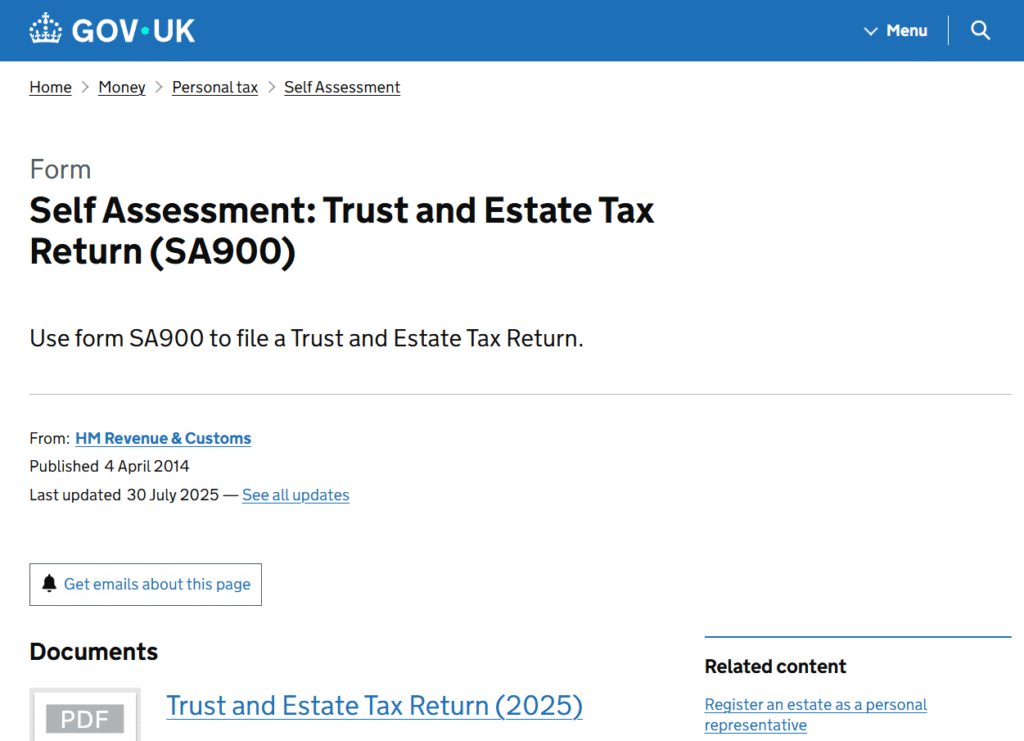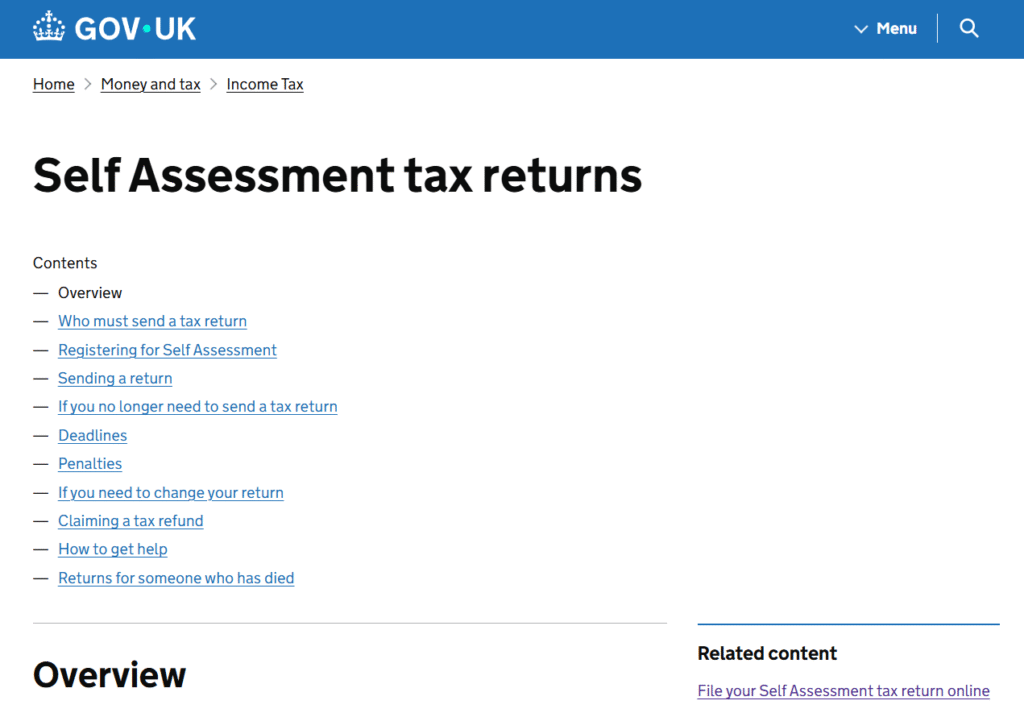SA900 Form: Trust and Estate Tax Return (UK)
The HMRC SA900 form (Trust and Estate Tax Return) is one of the most important UK tax documents for trustees, executors, and personal representatives. It ensures that income, gains, and taxes from trusts and estates are correctly declared to HM Revenue & Customs (HMRC).
Official HMRC SA900 form and notes
Unlike standard Self Assessment forms such as the SA100, the HMRC SA900 is specifically designed for trusts and estates, where income and capital gains must be reported separately from individual tax returns.
Who Needs to File the SA900 Form?
Not everyone involved in a trust or estate must file this return, but in many cases it is legally required. You need to submit an hmrc sa900 if:
- You are a trustee of a UK resident or non-resident trust.
- You are an executor or administrator managing the tax affairs of a deceased person’s estate.
- The trust or estate has received taxable income – rental, dividends, bank savings, pensions.
- The trust or estate made a capital gain (e.g., selling property, shares).
- HMRC has specifically issued a notice to file SA900.
Our Inheritance Tax Planning services ensure that trustee obligations are correctly managed and reported – Tax Planning Services for Inheritance
More details from HMRC – https://www.gov.uk/self-assessment-tax-returns/trusts-and-estates
Step-by-Step Guide to Completing the SA900
Filling in the HMRC SA900 form requires careful attention to detail. Here is the process:
- Download SA900 form PDF 2025 (paper) or use approved HMRC software.
- Enter details about the trust/estate – name, reference, and accounting period.
- Report all income sources:
- Dividends
- Rental income
- Interest from savings
- Pensions or annuities
- If applicable, declare capital gains – e.g., property or investments sold.
- Deduct allowable expenses (trust management, estate administration).
- Include tax already paid (at source or via prior payments).
- Calculate the net tax liability.
- Ensure all trustees/executors agree, sign, and submit the form.
Filing Deadlines for SA900
- Paper return deadline: 31 October following the end of the tax year.
- Online submission deadline: 31 January following the end of the tax year.
If you miss these deadlines, HMRC will charge penalties starting at £100, with further daily penalties for ongoing delays.
Common Errors When Filing the HMRC SA900
Even experienced trustees can make mistakes when completing the SA900 form. The most frequent include:
❌ Failing to report worldwide income.
❌ Confusing trustees’ personal tax with the trust’s tax obligations.
❌ Omitting small capital gains, assuming they are exempt.
❌ Claiming non-allowable expenses.
❌ Missing supplementary pages (e.g., SA905 for non-resident trusts).
❌ Late submission, resulting in automatic penalties.
Example Cases – Why Accuracy Matters
Case 1: Discretionary Trust
A discretionary trust generated £15,000 in rental income and £3,000 in dividends. The trustee assumed bank interest below £500 was exempt and failed to include it in the SA900 return. HMRC issued an inquiry and penalties of £1,200. After Audit Consulting Group reviewed and corrected the return, the penalties were reduced.
Case 2: Estate Administration
An executor was handling a complex estate worth £1.2 million. Unsure about capital gains from property disposal, he filed an incomplete return. ACG assisted with completing the HMRC SA900, correctly reporting gains and offsetting losses, saving the estate over £7,000.
Practical Recommendations
✅ Always gather all financial records before filling out the form.
✅ Keep copies of trust deeds, probate documents, and HMRC correspondence.
✅ Double-check if you need supplementary pages (e.g., SA905, SA906).
✅ Use professional accounting software or engage a tax adviser for complex cases.
✅ File early – don’t leave it until January, when HMRC systems are overloaded.
Useful HMRC Resources
- SA900 form download
- Guidance notes – https://www.gov.uk/trusts-taxes
- Online filing – https://www.gov.uk/log-in-register-hmrc-online-services
FAQ – HMRC SA900
Q1: Do all trusts file the SA900 every year?
No. Only trusts/estates with income, gains, or a notice to file must submit.
Q2: Can I file the SA900 myself?
Yes, but it can be complex. Many trustees appoint tax advisers for accuracy.
Q3: What happens if I submit an incorrect SA900?
HMRC may open an inquiry, issue corrections, or charge penalties for errors.
Q4: Is the SA900 linked to the trustee’s own Self Assessment?
No – the trust/estate tax return is separate from personal returns.
Q5: Can the SA900 be filed online?
Yes, via commercial HMRC-approved software or through an authorised agent.
Why Work With Audit Consulting Group?
Completing the HMRC SA900 form requires not just accuracy but also understanding of trust law and estate administration. Errors can cost thousands in penalties or excess tax. At Audit Consulting Group, we:
- Complete and file SA900 forms accurately.
- Handle HMRC correspondence and inquiries.
- Optimise allowable deductions and reliefs.
- Prevent late filing penalties.
- Provide ongoing advice for trustees and executors.
Contact Audit Consulting Group today – we’ll ensure your SA900 tax return is correct, timely, and stress-free.
SA900 Trust & Estate Tax Return Services Cost UK
Prepare SA900 trust and estate tax returns in the UK with professional support. We assist trustees with accurate reporting and HMRC submissions. Our SA900 services help ensure compliance and reduce administrative burden.
Service Cost Estimation
Select the service category below to calculate the estimated cost of either accounting & tax services or forms and submissions.
Select Required Services / Forms
Select one or more services/forms to receive an accurate cost estimate. You can adjust your selection at any stage.
How would you like to engage our services?
Please select whether you require a one-off service or ongoing monthly support.
Contract Duration
Your cost estimate
Apply now and get 10% OFF
Submit your request today and receive an exclusive 10% discount on your selected service.
All prices are estimates. To receive a personalised quote, please fill out the form or contact us.
Ready to get started?
Get professional support from experienced UK accountants







